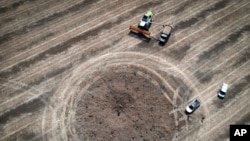On July 18, Russia made the unconscionable decision to pull out of the Black Sea Grain initiative. Since then, “the Kremlin’s campaign of relentless attacks on Ukraine’s Black Sea and Danube river ports have damaged more than 160 civilian infrastructure facilities and destroyed more than 300,000 tons of grain,” said USAID Administrator Samantha Power at the Second International Grain from Ukraine Summit.
“These are obviously not military targets. The Russian military is carrying out a very deliberate strategy: attempting to destroy Ukrainian livelihoods, tank the Ukrainian economy, and deploy hunger as a weapon of war – exacerbating the global food crisis and inflicting further pain on communities around the world who are already struggling to get enough to eat,” she said.
But the United States will not let that happen, said Administrator Power:
“In July 2022, USAID launched AGRI-Ukraine to bolster Ukraine’s agricultural production and help Ukraine’s farmers continue feeding the world in the face of Russia’s unprovoked war. To date, we’ve invested $350 million, mobilized an additional $250 million from partners, and we are now seeking to galvanize an additional $250 million in support from the private sector, foundations, and other donors.”
“The results of this work are remarkable,” said Administrator Power:
“In partnership with the Ukrainian government and the transport and logistics industry, we are helping build up alternative transport routes via road, via rail, via river port. We are providing grain elevators and loading equipment that helps speed the process of getting grain onto transport. We are helping increase the capacity of ports along the Danube River. And over the next three years, USAID will help upgrade border crossing points to export more grain.”
In addition, we have helped create 1.5 million metric tons of grain storage that has helped thousands of Ukrainian farmers keep their grain from rotting as it waits to ship.
Moreover, private sector partners like Bayer and Corteva have helped provide over 30 percent of Ukraine’s farmers the financing, seeds, and fertilizer that they need to plant their next harvests.
These investments are going to help Ukraine’s farmers stand up to Russia’s aggression, said Administrator Power. “But they’re also an investment in Ukraine's long term future – in the breadbasket that will help feed the world for generations to come.”






